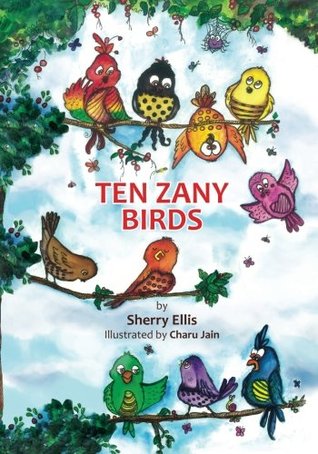
Thanksgiving has come and gone and November is about to slam the door. On the final day of this eleventh month, I'd like to do a book review.
Georgia author, Sherry Ellis, has self-published Ten Zany Birds, a rhyming picture book which the author describes as "a feathered festival." The story itself is an old concept--begin with ten and one by one, the zany birds fly away leaving only one in the end. As a child, I remember a rhyming book about ten little Indians--sure to be labeled politically incorrect in present times. My children learned a rhyming jingle about ten little monkeys jumping on a bed. One fell off....you get the picture.
Sherry Ellis has brought the old concept up to date while introducing counting and basic subtraction skills. Colors and patterns (stripes, spotted, and polka-dotted) also come into play in this picture book. Humor and whimsy float from page to page as the silly and easily distracted birds fly away, one by one.
The book would be fun for parent, grandparent or teacher to read to a pre-school child. Early readers would delight in the rhyming and fun throughout this book. as well as the illustrations.
Charu Jain, an artist who lives in India, illustrated the book. Her interpretation of the zany birds adds much to the author's story. The vibrant colors and whimsical expressions on the birds creates more joy when reading this book.
Being a writer myself and a word person, I would have loved to see some explanation of the key word in the title--zany. It's definitely not a word most pre-schoolers are acquainted with. Perhaps the story itself transfers the meaning of the word to the children. But this is a counting and basic subtraction concept book so perhaps I ask too much. I would love to know how Ms Ellis picked the word zany to include in the title and repeated rhyme within the book itself.
I asked my nine-year-old grandson to read the book when he was here on Thanksgiving Day. I told him it was for children much younger than he is but that I'd like his opinion to help me review the book. Cole read the book and then sat down at the computer to write his review. I've listed the things he liked below with my additions in red:
- It shows what they (birds) look like.
- I like when they fly away
- They are all different colors
- The birds look funny
- The birds always look like they are having fun
- I like the last page
- It was a good book
He did say he didn't like that it said the same thing on almost every page. We talked about the importance of using repetition when young children are learning to read and that children his age didn't need to have that repeating process anymore.
I think I agree with my grandson. It was a good book. Gift-giving time is looming close. If you have little ones on your list, consider Ten Zany Birds by Sherry Ellis.











